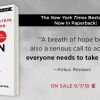18 Best-Selling Epidemic Books Millions Trust
Top Epidemic Books recommended by Jon Najarian, Pierre Haski, and Jeff Dean, offering trusted insights into epidemic history and response







There's something special about books that both critics and crowds love, especially when it comes to epidemics. Epidemic books have surged in importance as understanding past and present outbreaks guides global health decisions. Millions have turned to these works to grasp complex viral threats and social responses, reflecting a proven value in their trusted narratives and expert endorsements.
Experts like Jon Najarian, CNBC anchor and co-founder of Investitute, found The Hot Zone invaluable for its gripping take on Ebola's origins. Pierre Haski, geopolitical commentator, recalls its relevance during the SARS crisis. Meanwhile, Jeff Dean, Senior Fellow at Google AI Health, highlights The Great Influenza for its lessons on pandemic transparency and science.
While these popular books provide proven frameworks, readers seeking content tailored to their specific Epidemic needs might consider creating a personalized Epidemic book that combines these validated approaches. This option lets you focus on the aspects most relevant to your interests and expertise.
Recommended by Jon Najarian
Co-Founder @Investitute, CNBC Anchor
“I believe both the corona virus and ebola have a bat connection. Scary, but great book on ebola: Hot Zone by Richard Preston” (from X)
by Richard Preston··You?
by Richard Preston··You?
Richard Preston, a long-time New Yorker contributor and recipient of the CDC's Champion of Prevention Award, plunges you into the terrifying emergence of the Ebola virus with a narrative that reads more like a thriller than typical medical text. You gain insight into the virus's deadly pathology and the urgent containment efforts led by military and scientific teams, learning how an obscure pathogen can trigger global panic. The book details the biology behind viral outbreaks and the human response, especially in chapters describing the 1989 Reston incident. If you want to understand epidemic dynamics through a gripping story, this book offers a vivid window; however, it may be intense for those seeking purely clinical or technical accounts.
Recommended by Jeff Dean
Senior Fellow & SVP, Google AI Research and Health
“Thanks for the pointer, @joetimmons79! Also, looks like John Barry, the speaker in the video, is an author, & has an interesting looking book about the 1918 flu (if flu pandemic books while social distancing is your cup of tea: I've added to my queue):” (from X)
by John M. Barry··You?
by John M. Barry··You?
During his extensive research into the 1918 flu pandemic, John M. Barry uncovered the complex interplay of science, politics, and public health that shaped one of history's deadliest outbreaks. This book offers you a detailed account of how the influenza virus spread globally during World War I, revealing the challenges of managing a pandemic before modern medicine. You'll gain insights into the critical importance of transparency and trust in leadership during health crises, illustrated through Barry's exploration of government responses and scientific efforts. Ideal for anyone interested in epidemic history or the foundations of pandemic preparedness, it provides a clear-eyed look at how past lessons still resonate today.
by TailoredRead AI·
This tailored book explores battle-tested epidemic methods crafted to address real-world challenges effectively. It covers the principles behind epidemic dynamics, response coordination, and prevention tactics, blending widely trusted knowledge with your personal interests. By focusing on your background and goals, the book reveals how epidemic understanding can be deepened through insights that match your expertise and ambitions. Readers will engage with customized content that examines outbreak patterns, public health interventions, and adaptive responses, ensuring the learning experience is both relevant and impactful. The personalized format means you explore vital epidemic concepts that matter most to you, making complex topics accessible and meaningful.
Recommended by Natalie Shure
Head of research at Adam Ruins, writer
“I finished this book last week and it was absolutely superb. I’d highly recommend it to any organizer! Even if you’ve already seen the companion doc (which is also great!) this adds a lot. I have great taste and you should take this rec very seriously.” (from X)
by David France··You?
What started as a quest to document AIDS activism evolved into David France's deeply reported narrative revealing how grassroots activists transformed the fight against a deadly epidemic. You gain insight into the strategies these communities used to become expert advocates, researchers, and negotiators, effectively reshaping drug development and policy. The book details personal stories—like those in chapters on ACT UP's founding and underground drug markets—showing how ordinary people demanded recognition and partnership in science. If you're drawn to social justice, medical history, or grassroots mobilization, this book offers a vivid inside look at the intersection of citizen action and scientific progress.
Recommended by Kaleigh Rogers
Reporter at FiveThirtyEight and The New York Times
“@rachsyme Spillover is a fantastic book though. I'd also recommend Pandemic and/or The Fever by Sonia Shah” (from X)
by David Quammen··You?
by David Quammen··You?
David Quammen’s decades as a nature writer and science journalist led to this detailed exploration of how animal diseases jump to humans. You’ll encounter vivid accounts from fieldwork, like netting bats in China and tracking gorillas in Congo, revealing the complex science behind spillover events. This book teaches you to understand the mechanisms of viral transmission and the global risks of pandemics through real examples such as Ebola and SARS. If you want a grounded, investigative look at emerging infectious diseases beyond headlines, this deep dive suits you well, especially if you appreciate science told through storytelling rather than dry summaries.
Recommended by Gustavo Arellano
Syndicated columnist ¡Ask a Mexican!
“Dreamland spreads out like a transnational episode of The Wire, alternately maddening, thrilling, depressing, and with writing as sharp and insightful as a razor blade. You cannot understand our drug war and Mexican immigration to the United States without reading this book.”
by Sam Quinones··You?
by Sam Quinones··You?
Sam Quinones brings nearly three decades of journalistic experience to this gripping exploration of America's opiate crisis. You get a detailed look at how overprescription of opioids and a unique heroin distribution network from a small Mexican town combined to devastate communities nationwide. Chapters vividly portray the rise of OxyContin alongside the flood of black tar heroin, revealing the social and economic forces fueling addiction. If you're seeking to understand the intertwined roles of Big Pharma, immigrant entrepreneurs, and local struggles, this book offers clear-eyed narratives that connect the dots. It's especially useful for those interested in public health, policy, or the human stories behind the epidemic.
by TailoredRead AI·
This tailored book explores epidemic knowledge through a focused, step-by-step approach designed to match your background and goals. It covers essential concepts such as outbreak dynamics, transmission pathways, and public health measures, combining widely validated insights with your specific interests. By concentrating on areas most relevant to you, this personalized guide reveals the foundation and application of epidemic understanding in a clear, concise manner. The book guides you through key epidemic events and modern response techniques, providing a tailored journey that accelerates your learning. It offers a unique opportunity to engage deeply with epidemic essentials while aligning with your personal pace and focus areas.
Recommended by Peter Monn
Author and digital content creator
“This book was amazing. So important. Can’t wait to watch this!” (from X)
Beth Macy's decades of investigative journalism led to this detailed chronicle of America's opioid epidemic. She takes you from pharmaceutical boardrooms to small-town communities, revealing how aggressive marketing and regulatory failures fueled addiction. You'll gain insight into the human toll through intimate stories, such as the chapter on a single dealer turning local athletes into victims. This book benefits anyone seeking to understand the epidemic’s complexity beyond headlines, including healthcare professionals, policymakers, and concerned citizens. Macy doesn't shy away from exposing systemic greed while highlighting resilience among those fighting for recovery.
Recommended by Laura Mcinerney
Co-Founder of TeacherTapp, education expert
“@langtrygirl It’s a really good book. You’ll love one character: a little public health woman, around 40, who was completely correct about it all and kept being ignored. I almost want this as a tattoo:” (from X)
by Michael Lewis··You?
by Michael Lewis··You?
During the early days of the COVID-19 crisis, Michael Lewis uncovered a gripping narrative about the people who saw the pandemic coming and tried to sound the alarm. You gain insight into the complex dynamics between public health experts, government officials, and the challenges of organizational inertia, illustrated through vivid profiles like the local public health official who identified key blind spots in CDC responses. This book reveals how expertise and bureaucratic resistance collide, offering you a deeper understanding of epidemic preparedness and response. It's a revealing look at what happens when science meets politics, especially relevant if you're interested in public health, policy, or crisis management.
Recommended by Russell Poldrack
Professor of Psychology at Stanford University
“I should also take this chance to plug Maryn McKenna's book Beating Back The Devil which highlight amazing work by CDCgov” (from X)
by Maryn McKenna·You?
Drawing from her extensive background in public health journalism, Maryn McKenna offers an insider's look at the U.S. Centers for Disease Control and Prevention's Epidemic Intelligence Service in this book. You gain detailed insights into how these disease detectives track and combat outbreaks like SARS, anthrax, and West Nile virus, revealing the complexity behind epidemic response. For example, McKenna explores specific investigations and the pressures faced by these professionals, which brings a human element to the science and strategy involved. This book suits anyone interested in epidemiology, public health policy, or the real-world challenges of outbreak management, though it may appeal less to those seeking purely scientific or clinical texts.
Recommended by Elizabeth Kolbert
Pulitzer Prize-winning author of The Sixth Extinction
“Crisis in the Red Zone reads like a thriller. That the story it tells is all true makes it all more terrifying, and there’s no one who could tell it better than Richard Preston.”
by Richard Preston··You?
What happens when a seasoned nonfiction writer dives into the heart of an epidemic? Richard Preston brings you into the gripping reality of the 2013–2014 Ebola outbreak, chronicling the rapid spread and deadly consequences through vivid storytelling. You gain insight into the ethical dilemmas faced by doctors, the frantic efforts of global health teams, and the race to develop treatments amid chaos. Chapters detail the virus's mutation and its unprecedented leap across continents, offering a sobering look at viral threats in our interconnected world. This book suits those curious about epidemiology, global health crises, and the human stories behind headline-grabbing outbreaks.
Recommended by Science
“An easily approachable yet factually rich narrative. Oshinsky provides a very readable and enlightening history that also can be appreciated as good storytelling.”
by David M. Oshinsky··You?
by David M. Oshinsky··You?
David M. Oshinsky, a historian of modern American politics and society, uses his expertise to unravel the complex story behind the polio epidemic in mid-20th century America. You’ll gain insight into how the national panic over polio shaped public health, vaccine development, and even legal standards, with detailed portraits of key figures like Jonas Salk and Albert Sabin. The book also explores the innovative fundraising by the National Foundation for Infantile Paralysis and reveals how social fears influenced the disease’s perception. If you want a nuanced look at the intersection of science, society, and epidemic response, this book offers rich historical context and compelling narrative.
by Molly Caldwell Crosby·You?
by Molly Caldwell Crosby·You?
What if everything you knew about yellow fever was wrong? Molly Caldwell Crosby dives deep into the historical and medical saga of this devastating disease, tracing its impact from 19th-century Memphis to modern outbreaks in Africa. You’ll explore the harrowing 1900 U.S. expedition to Cuba, where doctors risked their lives to uncover the virus’s transmission, reshaping public health forever. This book unpacks how yellow fever influenced wars, commerce, and even the location of the U.S. capital, offering readers a vivid narrative filled with human courage and scientific discovery. If you’re interested in the intersection of history and epidemic science, this book gives you a gripping and insightful account.
by Ann H. Kelly, Frédéric Keck, Christos Lynteris··You?
by Ann H. Kelly, Frédéric Keck, Christos Lynteris··You?
Drawing from her extensive background in global health and social medicine, Ann H. Kelly, alongside Frédéric Keck and Christos Lynteris, explores how epidemics act as transformative social phenomena that reshape human and non-human relationships. You’ll gain insights into the socio-material dynamics of infectious disease outbreaks, especially within sub-Saharan African contexts, seeing epidemics beyond just biological events but as catalysts of societal shifts. The book breaks down complex anthropological frameworks, providing you with a deeper understanding of how epidemics influence cultural, political, and ecological dimensions. If you’re interested in the intersection of disease and society, this book offers a nuanced perspective that challenges conventional views and expands your grasp of epidemic impacts.
by Elizabeth A. Fenn·You?
by Elizabeth A. Fenn·You?
Elizabeth A. Fenn delves into a largely overlooked chapter of American history, revealing how smallpox profoundly shaped the Revolutionary War and the early United States. You gain a detailed understanding of how the epidemic influenced military campaigns, such as its devastating impact on troops at Québec and the strategic decisions at Valley Forge. Fenn’s meticulous research extends beyond battles, exploring the disease's effects on various communities from escaped slaves to Native American tribes. If you want to grasp the intersection of epidemic disease and American history, this book offers precise insights into the human and political consequences of smallpox during a pivotal era.
by James I Slaff·You?
by James I Slaff·You?
James I Slaff brings a focused medical perspective to the AIDS crisis, compiling the latest research available in the mid-1980s into a clear examination of acquired immune deficiency syndrome. You’ll find detailed discussions of transmission methods alongside practical recommendations aimed at reducing risk, grounded in the era's scientific understanding. This book suits those seeking a fact-based, medical overview of AIDS during a time when much about the disease was still emerging. If you want historical insight into early epidemic response strategies and the science behind them, this book offers a grounded, informative read without embellishment or speculation.
by David Shenk·You?
by David Shenk·You?
When David Shenk first realized how Alzheimer's disease silently reshapes identity, he set out to illuminate its profound human impact. This book offers you a deep dive into the epidemic's history and science, blending art, literature, and neurobiology to reveal how memory loss erodes the self. You gain insights into the disease's progression through vivid patient and caregiver portraits, alongside an exploration of the fierce scientific race toward a cure. If you seek a thoughtful understanding of Alzheimer's beyond statistics, this book invites you into the complex emotional and societal challenges it presents.
Recommended by Gregg Gonsalves
Assistant professor at Yale, epidemiology expert
“Just had our students read the chapter on Bubonic plague outbreak. Such a great book.” (from X)
When Nayan Shah examined the public health policies targeting Chinese immigrants in San Francisco's Chinatown, he uncovered a complex narrative of race, disease, and social control that reshaped public perceptions over decades. This book dives into how sanitary laws and health campaigns were used both to marginalize and to regulate Chinese communities, revealing the interplay between racial stereotypes and public health bureaucracy. You’ll gain insight into the historical mechanisms that framed Chinese immigrants as disease carriers while also exploring their political responses through protests, legal actions, and cultural expression. If you’re interested in how epidemics intersect with race and policy, this book offers detailed case studies and a nuanced look at social dynamics in American health history.
Recommended by Jeffrey A Tucker
Editorial Director @aier, Founder @atlbtcembassy
“The review of Scott Atlas's book are great, but I'm disappointed that AMZ has not published mine. I wonder how many other positive reviews are being withheld.” (from X)
by Scott W. Atlas M.D.··You?
Scott W. Atlas, M.D., brings his extensive background as a Stanford neuroradiologist and White House Coronavirus Task Force advisor to unveil the often unseen political and scientific battles within the Trump administration's COVID-19 response. You gain firsthand insight into the contentious debates on lockdowns, mask mandates, and vaccine timelines, along with a critical look at media influence and internal dynamics among key figures. Chapters detailing these clashes offer a behind-the-scenes perspective rarely found elsewhere, making the book particularly suited for those interested in the intersection of science, policy, and media during the pandemic. If you seek a candid, insider account rather than a purely scientific or medical analysis, this book will meet your expectations.
by Louise Kuo Habakus, Mary Holland·You?
by Louise Kuo Habakus, Mary Holland·You?
Louise Kuo Habakus and Mary Holland challenge the conventional wisdom that vaccine policies are purely science-driven by exposing the entwined influences of corporate interests and government mandates. You gain insight into the ethical, legal, and scientific controversies fueling the vaccination debate, including detailed personal stories and critical analysis of policy conflicts. The book rigorously examines parental rights, vaccine safety science, and the socio-political forces shaping public health decisions, making it essential for anyone questioning mainstream vaccine narratives or seeking to understand the complex intersection of health, law, and individual freedom. It’s a nuanced exploration rather than a simple argument, offering perspectives that often get overlooked in public discourse.
Proven Epidemic Strategies, Personalized ✨
Get trusted epidemic insights tailored to your focus and goals in minutes.
Trusted by thousands of epidemic enthusiasts and health professionals
Conclusion
This collection of 18 epidemic books reveals clear themes: the power of detailed historical accounts, the importance of community and activism, and the challenges of epidemic response on global and local scales. If you prefer proven methods grounded in gripping narratives, start with The Hot Zone and The Great Influenza. For validated approaches blending social and scientific insights, combine How to Survive a Plague with Spillover.
These books collectively deepen your understanding of epidemic dynamics and public health strategies. Alternatively, you can create a personalized Epidemic book to combine proven methods with your unique needs. These widely-adopted approaches have helped many readers succeed in grasping epidemic complexities and preparing for future challenges.
Frequently Asked Questions
I'm overwhelmed by choice – which book should I start with?
Start with The Hot Zone for a gripping narrative on viral outbreaks, or The Great Influenza for historical pandemic insights. Both are highly recommended by experts for their clear storytelling and foundational knowledge.
Are these books too advanced for someone new to Epidemic?
Not at all. Many selections, like How to Survive a Plague and Spillover, combine accessible storytelling with expert analysis, making them suitable for both newcomers and seasoned readers.
What's the best order to read these books?
Begin with historical overviews like The Great Influenza, then explore social activism with How to Survive a Plague, followed by scientific perspectives such as Spillover and The Premonition for a comprehensive understanding.
Should I start with the newest book or a classic?
Balancing classics like The Hot Zone with newer works like The Premonition offers context and current perspectives. This approach provides both foundational knowledge and recent epidemic response insights.
Do I really need to read all of these, or can I just pick one?
You can pick based on your interests—whether viral biology, social activism, or policy. Each book stands strong alone, but together they provide a richer, multi-dimensional view.
Can personalized epidemic books complement these expert recommendations?
Yes, personalized Epidemic books can tailor expert insights to your unique needs, combining popular proven methods with focused content. Explore options to create your personalized Epidemic book.
📚 Love this book list?
Help fellow book lovers discover great books, share this curated list with others!
Related Articles You May Like
Explore more curated book recommendations

















